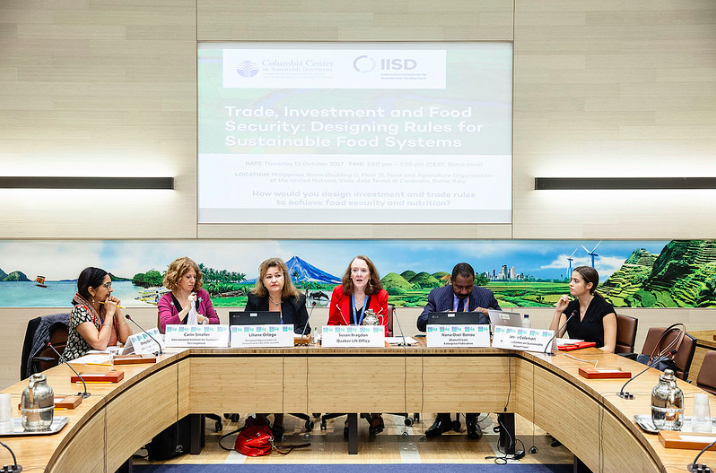CCSI at the 44th Plenary Session of the Committee on World Food Security
The Columbia Center on Sustainable Investment (CCSI), the International Institute for Sustainable Development (IISD), and the United Nations (UN) Sustainable Development Solutions Network (SDSN) co-organized a side event at the Committee on World Food Security’s (CFS) 44th Plenary Session in Rome, Italy last October. The session focused on the impact of trade, investment, and other legal regimes on achievement of food security and improvement of nutrition. Representatives from civil society, academia, the private and public sectors provided their insights and highlighted the challenges faced by policy makers and other stakeholders in creating and implementing policy coherence across trade, investment, and sustainable development agendas.
Opening the discussion, Susan Bragdon, Representative for Food and Sustainability at the Quaker UN Office (QUNO) and session moderator, raised questions regarding the extent to which trade and investment rules had achieved their purported objectives regarding food security, and noted increasing concern regarding the implications of these rules for governments’ abilities to adopt policies ensuring inclusive economic growth, improved livelihoods, greater access to food at more stable prices, and open markets for smallholders. Acknowledging the profound implications that trade and investment agreements have had in the recent decades on food security and nutrition, Susan made a call for improvement of these legal regimes “to create a healthy food system for all.”
Following these opening remarks, Liliane Ortega, of the Permanent Representation of Switzerland to the FAO, IFAD, and WFP, presented the findings from a case study in Southeast Asia, reaffirming that the linkages between governance decisions and food security are critical. Although availability and type of natural resources, education, human capital, and market opportunities are key factors for low-income countries to accelerate their performance with respect to poverty reduction and economic development, Liliane stressed the importance of political choices and government accountability to promote sustainable livelihoods and tenure security.
From a private sector perspective, Nana Osei-Bonsu, Ghana’s Private Enterprise Federation Chief Executive Officer, emphasized the need for greater public-private sector collaboration in the agricultural sector. He noted that these partnerships show the potential power of the private sector to engage and support investment in research and innovation to address the range of critical challenges facing the agricultural sector, including those related to climate change. Nana also emphasized that well-defined domestic legal frameworks are critical for facilitation of investment.
Jesse Coleman, a Legal Researcher with CCSI, spoke about the impacts of international investment agreements and investor-state arbitration on the ability of states to regulate in the public interest and realize sustainable development objectives, including with respect to food security and improved nutrition. Her presentation also provided an overview of some of the options available to policy makers seeking to address these implications. Jesse’s presentation underscored the need for informed democratization of the debate on investment promotion and protection – “if we are to achieve policy coherence and align investment law obligations with the broader public interest, it is critical for these debates and discussions to be taking place at events like CFS.” Jesse concluded that investment facilitation, promotion, and protection is all a means to an end, and we cannot lose sight of the end – in this case, sustainable investment in agriculture with a view to fulfilling the right to food, achieving zero hunger, and improving nutrition.
Carin Smaller, Advisor on Agriculture and Investment at IISD, elaborated on the implications of the investment law regime by highlighting a recently registered investor-state claim concerning a large-scale agricultural investment in Tanzania. Her presentation called attention to the risks and opportunities associated with the recent push for establishment of agricultural growth zones across Africa, a strategy designed to incentivize large-scale private investment in agriculture. Carin recognized that these special zones are potentially powerful tools to attract investment in the agricultural sector; however, Carin’s presentation underscored the need for these zones to be properly regulated, and for the rules governing agricultural growth zones to fully interact with domestic laws.
In the final intervention, Shiney Varghese, Senior Policy Analyst at the Institute for Agriculture and Trade Policy and member of the High-Level Panel of Experts on Food Security and Nutrition, echoed Jesse and Carin’s remarks, providing further detail on the impact of investor-state arbitration on realization of the right to water and, relatedly, on food security and improved nutrition. Shiney’s presentation emphasized the need for reform of the investment regime and alignment of the regime with human rights obligations.
Following these presentations, discussion was opened to questions from the floor. Attendees emphasized the need for greater focus on the effects of trade and investment agreements on other obligations of host and home states, including under human rights law. Overall, the side event illustrated the importance of raising the profile of dialogue on reform of trade and investment rules beyond fora exclusively dedicated to discussions of investment and trade law. It was concluded that democratizing the debate and raising awareness of the diverse impacts of trade and investment agreements will be critical to meaningful and effective reform of these regimes.
******
CCSI also participated in two other side events at CFS 44: the first, co-organized by CCSI, the Land Portal, the Global Land Tool Network, the Global Land Indicators Initiative, and the UN SDSN Thematic Network on Good Governance of Extractive and Land Resources, addressed the range of initiatives currently underway to advance and monitor progress around land-related SDGs. The second side event, organized by the Global Donor Working Group on Land, focused on the impact of increasing capital flows to rural areas in Sub-Saharan Africa and the implications for land policy and agricultural transformation in the region.
This blog was authored by Sarah Cruz, an intern with CCSI’s Investment Law & Policy team.

